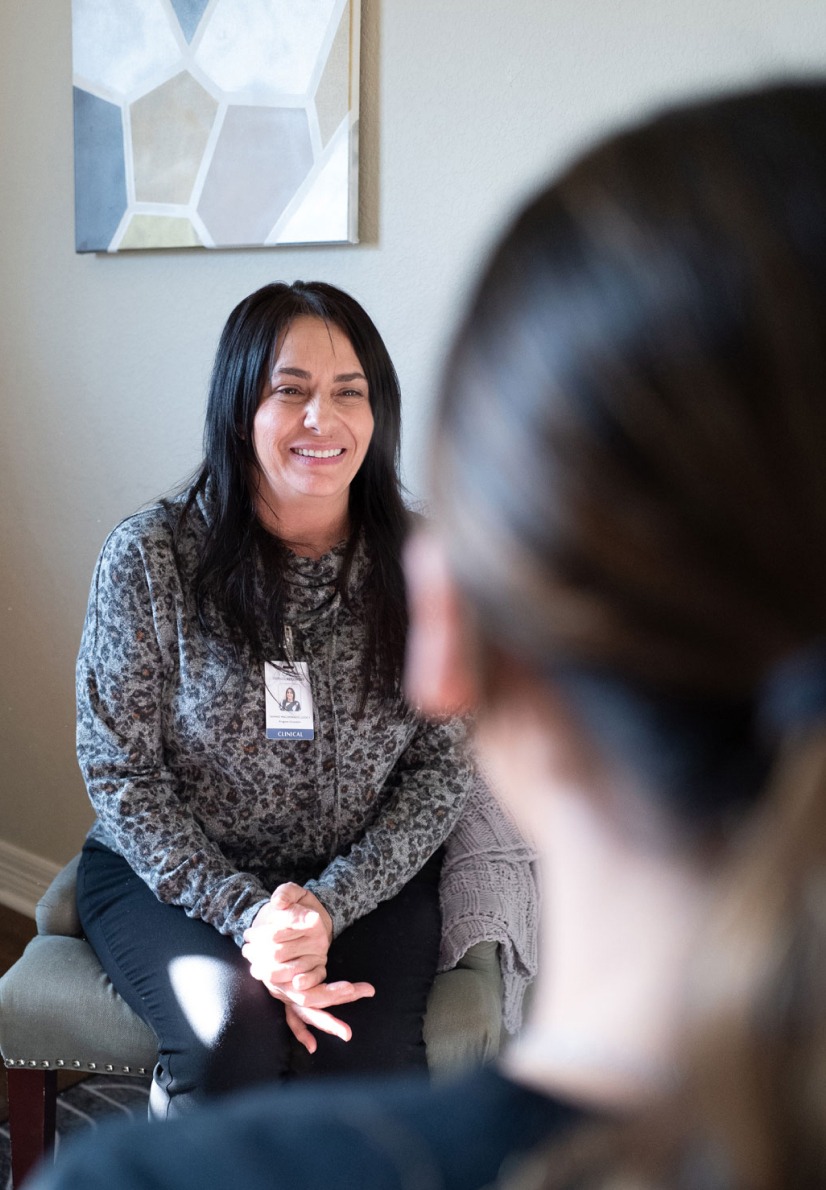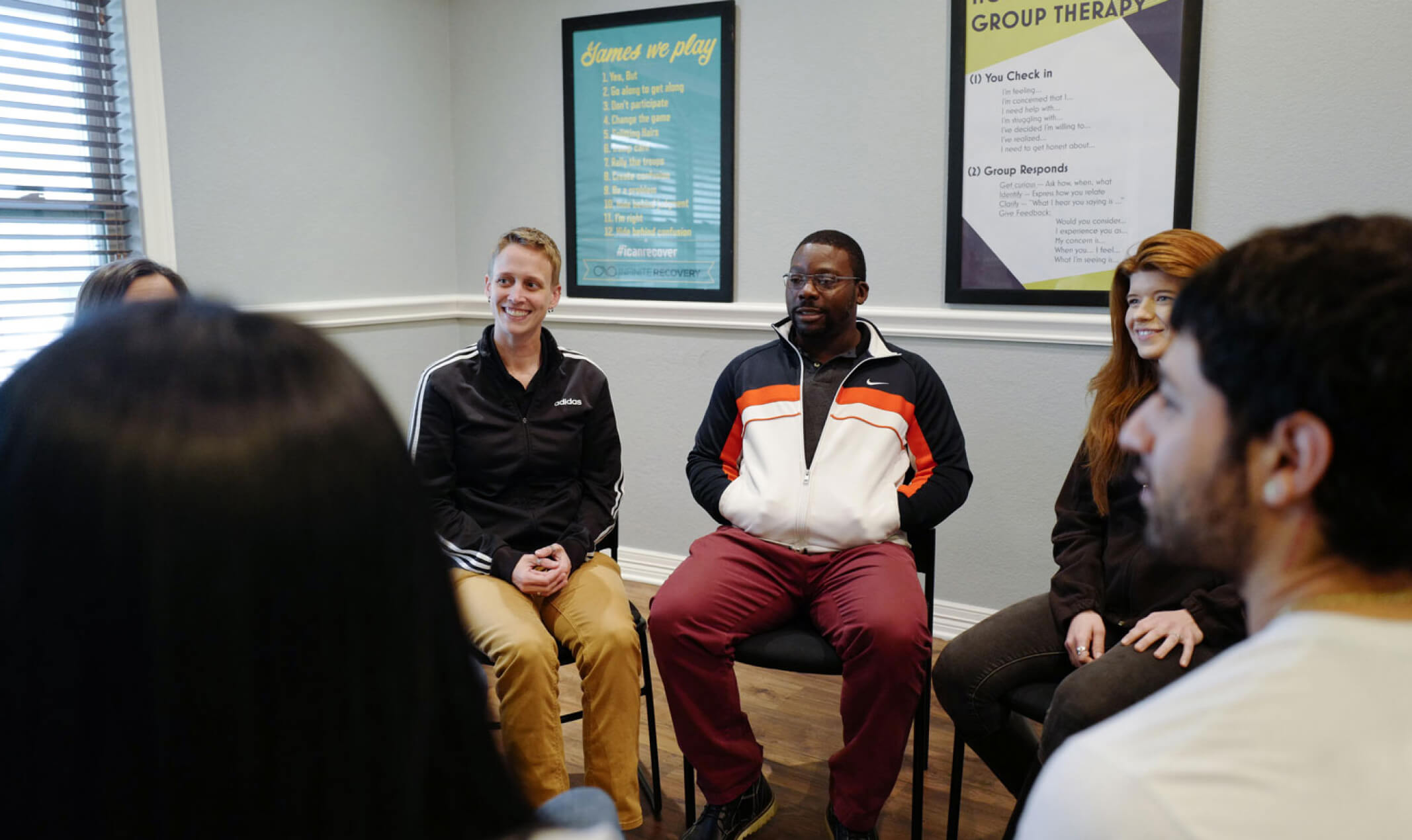Group Therapy
– Austin TX
Infinite Recovery provides group therapy in Austin, Texas, for clients in our inpatient and outpatient addiction treatment programs. Group therapy is the cornerstone of our recovery program and provides an opportunity for clients to share their stories, learn from their peers and create relationships they can rely on to support them long after they leave treatment.
When coupled with individual therapy and other holistic treatments, group counseling can help individuals process their past and create healthy new futures that are worth staying sober for.


Benefits of Group Therapy

Humans have a biological need for community and naturally form groups, which makes a group setting a particularly helpful environment in which to find healing and support. Research has found that group therapy can help create a culture of recovery by reducing feelings of isolation and giving clients the opportunity to witness the recovery of their peers. [1] There are many benefits of group therapy for the addiction recovery process, including:
Isolation, depression and shame commonly accompany substance abuse disorders [1] and may lead to or exacerbate other mental health conditions. Many individuals with substance use disorders also have co-occurring mental health disorders. [2] Experiencing the acceptance and sense of belonging that accompany being part of a group can be very healing and support long-term recovery. [1] When combined with individual therapy, group counseling can help reduce mental health symptoms and support clients in forming healthy coping mechanisms and emotional awareness.
A group can provide a particular kind of accountability that individual relationships cannot. In an addiction treatment setting, groups can offer positive peer support for members to abstain from substance abuse and stay on track with their treatment goals. [1] Many of our clients who participate in group therapy make connections and relationships that they maintain long after leaving treatment, which provides an additional layer of support and accountability as they transition back to the outside world.
Within a group therapy setting, group members have the opportunity to practice relational skills that will support them in their new sober lives. These may include emotional awareness, active listening, clear communication, boundary setting and empathy. Practicing these tools within a safe and supportive setting can help solidify them and prepare clients for navigating more challenging relationships when they return to work, school, or their families.
During group therapy, members have the chance to hear from others who are struggling with similar challenges. By witnessing how others respond to problems such as a difficult relationship or stressful work environment, group members can gain insight into how to respond to their own stressors. They can also solicit feedback from the group and benefit from the insight and experiences of those who have been through something similar. This provides a unique opportunity for problem solving and creating healthy coping mechanisms.
Our Group Therapy Treatment Approach
Our group therapy sessions are firmly rooted in the 12-step philosophy. The 12 steps, as outlined by Alcoholics Anonymous, revolve around the concept that addicts are powerless over their addiction and must rely on a greater power to make amends for the past and experience a spiritual awakening that will propel them on their recovery journey.
Whether or not a person is a spiritual or religious person coming into treatment, these steps have been proven to be effective in helping individuals maintain their sobriety and free their lives from the grips of substance abuse.
In addition to the 12 steps, our clinicians utilize holistic, trauma-informed therapeutic approaches to guide and support clients during group therapy. These may include cognitive behavioral therapy, dialectical behavioral therapy, motivational interviewing and family dynamics therapy.
The goal of both our individual counseling and group therapy sessions are to help clients develop healthier relationships with themselves and their loved ones, and through this process create a solid foundation for long term sobriety.
How Group Therapy Works
During a group therapy session, a certified therapist will facilitate a discussion around a particular topic. The therapist may ask a particular member to share, prompt reflections from other group members or offer some of their own insight.
The group environment enables clients to feel seen and understood in their experience as well as to learn from the stories and experiences of other participants. Groups usually meet for one or two hours and are kept small so that everyone has a chance to contribute if they wish. Typically, groups also have rules around confidentiality and how to process emotions or tensions that arise during the course of group discussion.
How Group Therapy Differs from Individual Counseling
A therapy group setting offers certain advantages over individual counseling, but also lacks some of the benefits. In group therapy, a person can learn from the experiences and insights of other members or participants. Instead of just receiving feedback from a single therapist, they can draw on the wisdom of others who have been in similar situations. However, a support group does lack the privacy and focused attention of an individual therapy session.
Individuals who are wary about sharing their feelings or details of their life, or who experience social anxiety, may prefer working with a therapist one-on-one.
Other Therapies We Offer
While group therapy is the backbone of our Austin, Texas, treatment program, we also offer a range of other therapies and treatments to holistically address the issues underlying our clients’ addictions.
When used in combination, these modalities contribute to healing on the body, mind, heart, and soul level, and contribute to long-term sobriety. Our goal is to not just help clients get sober, but to build fulfilling lives that don’t need to rely on the coping mechanism of substance abuse.
Our therapies include:
- ART Therapy (Accelerated Resolution Therapy)
- Boxing and Body Movement Therapy
- Cognitive Behavioral Therapy
- Family Therapy
- Family Dynamics Therapy
- Group Therapy
- Individual Therapy
- Motivational Interviewing
- Relapse Prevention Therapy
- Spirituality Therapy

Find Group Therapy in Austin, TX for Addiction Recovery
If you or a loved one are seeking addiction treatment in Austin, TX with a strong group therapy program, reach out to Infinite Recovery today. We follow the 12 Steps for Recovery and incorporate a trauma-informed, evidence-based treatment approach into all of our group sessions.
The opposite of addiction is connection, and your healing begins with finding a supportive community that can provide accountability and encouragement as you walk the difficult path to recovery. We would love to welcome you into the Infinite Recovery family, no matter where you are in your journey. We offer a treatment program for every level of care an individual may need, from detox to residential rehab to outpatient services. All of our programs accept insurance so that cost doesn’t have to be a barrier to you getting the help you need.
Speak with a member of our admissions team confidentially today to learn more about our programs and services or to verify your insurance company coverage and begin the admissions process.